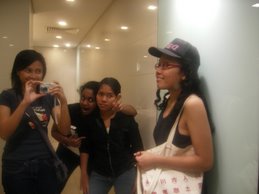We present ourselves differently in the real world and in the virtual world. The real world provides a more stabilized identity with the presence of physical matter (Donath, S.J., 1996). The virtual world on the other hand can only offer so much. Lack of physical cues require someone who is conversing online to provide more information. In situations where physical contact is absence, it is easier to pose as somebody else. Like how people can make prank calls, online chatrooms can also be a place for people to manipulate others.
Human being is multifaceted. We posses multiple personas. It is not to say that we are not being our 'true' selves, but instead we are able to adapt ourselves to different situations. Suler (2002), explained that cyberspace offers a niche for each of these specific facets of selfhood. Online chatrooms serve as a venue for us to communicate with poeple of similar interest. Sometimes we enter several chatrooms that cater to out specific interests. According to Suler, we can express and develop specific interests and life experiences while setting aside others. This means that if we are in a group devoted to music, we may not need to talk about it in another group that discusses political issues. There are times when we present our true self, while there are times when we take on a different persona. Why?
I believe that the anonymous setting allows us to eliminate certain information that we might not want others to know. I prefer to use my real name in e-mails as it is easier for my contacts to identify me. To me, the purpose of e-mails are to send and recieve messages. In chatrooms however, i go by a nickname taken from a character from a book. This is because, unlike e-mails where most of my contacts know me face to face, chatrooms are full of strangers. In such context, privacy is one of the factors, one hides his true identity. Although we may be the same person, but the manner in which we converse or interact may differ. Without revealing our true identity, we may actually express ourselves more freely. Bargh (2002), discovered that anonymity creates an atmosphere where an individual is free of constraints and expectations from those who know them in real life. People who are socially inept benefit from this anonymous situation. They are unable to gain a sense of belonging in real life but may in fact feel safe online.
Other than creating an online identity that is different from our real life identity, we can also establish a certain reputation in the virtual world. Words make up fro the lack of physical cues. How people precieve us depends on the tone and style of writing. Again, anonymity play an important role. We can choose not to disclose certain information or we can fabricate stories to create an impression. Besides the tone and style we convey online, the username you choose, the persona or avatar you assume in an online community are also important aspects of how people manage their identity in cyberspace (Suler, 2002).
As easy as it is to create or make up an online identity, the more easy it is for someone else to assume our identity. People can wish to change user name whenever they enter a chatroom. As a result, there are users with bad intentions who take on someone else's nicknames. Reputation can be tarnished and it may be hard to identify which one is the real user. Anonymity can also prove to be negative. An example would be online communities, where users want to be unknown because they are making negative remarks or flaming somebody else. However someone has been involved in the chatrooms or communities long enough for others to recognize him through his tone and style, it may be harder for other users to steal his identity.
In conclusion, the two characteristics of online communites namely, uncertainty and anonymity, can be beneficial or harmful. It is an advantage as we are able to express ourselves without any restriction and explore the various facets of our personality. Unfortunately identity theft can ruin one's reputation and loses one's significance in a particular community.
Reference
Bargh, J. (2002). Can You See the Real Me? Activation and Expression of the “True Self” on the Internet. Journal of Social Issues, 58(1). Retrieved February 21, 2007, from http://web.ebscohost.com.libproxy.sim.edu.sg/ehost/pdf?vid=11&hid=117&sid=27ba6674-d80f-4444-8c70-248153f6f55a%40sessionmgr9
Donath, S.J. (1996). Identity and Deception in the Virtual Community. Retrieved February 21, 2007, from http://smg.media.mit.edu/people/Judith/Identity/IdentityDeception.html
Suler, J.R. (2002). Identity Management in Cyberspace. Journal of Applied Psychoanalytic Studies, 4, 455-460. Retrieved February 22, 2007, from http://www.rider.edu/~suler/psycyber/identitymanage.html


